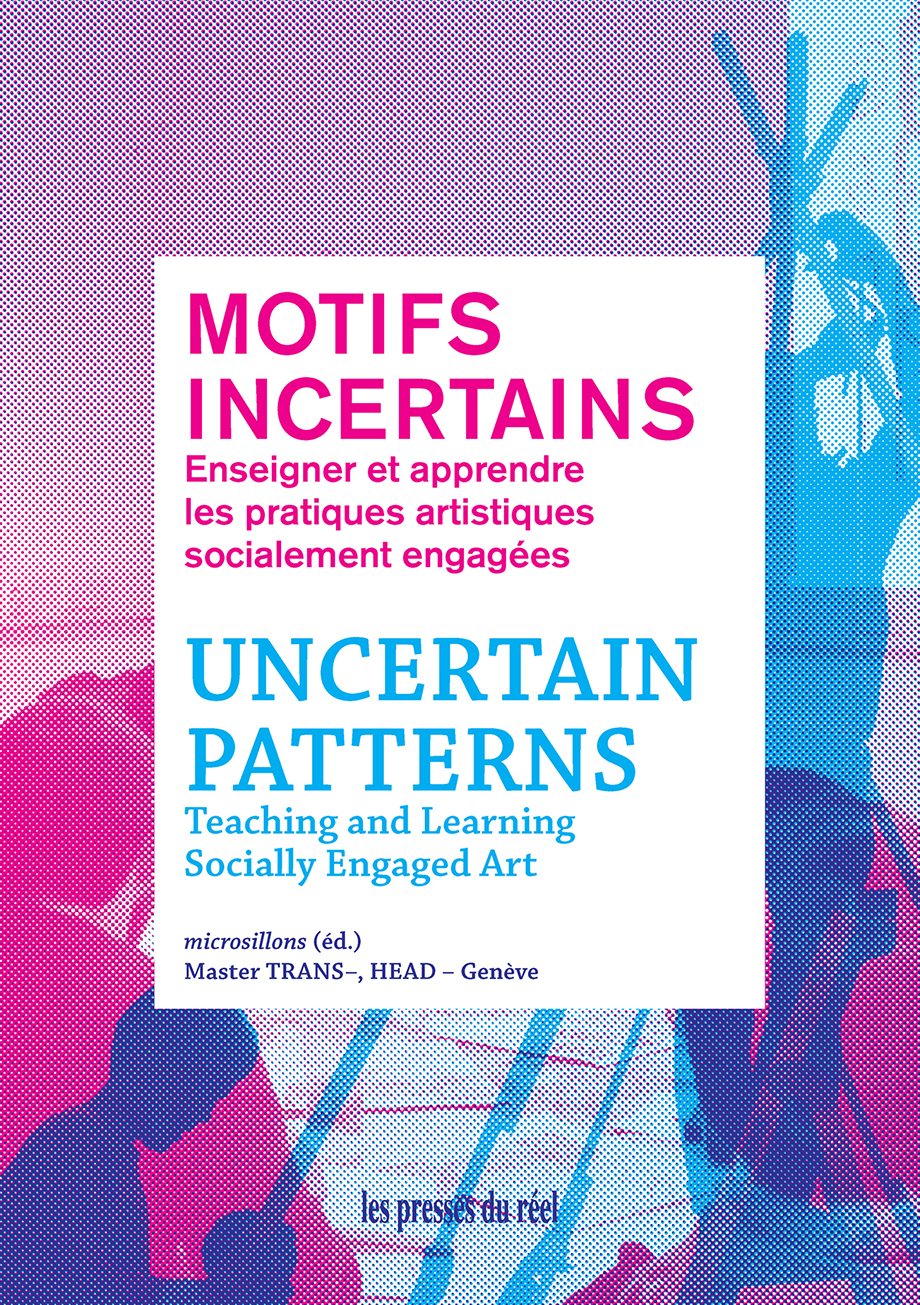- The school
- Studies and Research
- BACHELOR
- MASTER
- DOCTORATE
- RESEARCH
- TRANSDISCIPLINARITY
- POOLS
- CONTINUING EDUCATION
- Continuing education 2025-2026
- Artificial Intelligence, initiation
- Artificial Intelligence, Advanced
- Artificial intelligence open-source, ComfyUI
- Creative coding
- Engage with drawing
- Frame-by-frame animation
- Immersive Mapping : Unreal Engine & MadMapper
- 3D exhibition modeling in SketchUp
- 3D modeling, Blender
- Point cloud scanning
- Documentary podcast
- Serious games
- For students
- Studying at the HEAD
- InfoLab
- Living in Geneva
- Tuition fees and sholarship
- Library
- Regulations and instructions
- Projects
- Events
- Press
- Partnerships and prizes
Book Launch : Uncertain Patterns at LiveInYourHead
Mardi 16 avril 2019 à 18h
HEAD, Bâtiment Général-Dufour
Espace d'exposition | Cinéma Salle Robert Kramer
Rue de Hesse 5, 1204 Genève
UNCERTAIN PATTERNS
Teaching and Learning Socially Engaged Art
Since the beginning of the 1990’s, participatory and collaborative art practices have multiplied. Today, those practices form a field in itself and are grouped under the terms “socially engaged art practices”, “community-based art” or “dialogical art”. The art historian Claire Bishop talks about a “social turn” to describe this evolution. Those practices, as Gregory Sholette points out, are currently moving from the margins of the art world to its center, gaining a new institutional legitimacy, sometimes in a form of contradiction to their activist roots.
With this institutionalization, study programs teaching those practices are developing, mainly in Europe and the US for the moment. Because of the dialogic nature of most socially engaged art projects, many artists developing them and intellectuals commenting them developed an interest for critical approaches of pedagogy. Grant Kester – an art historian who coined the term “dialogical art” – is even drawing a parallel between the very nature of socially engaged art and the pedagogical approach of Paulo Freire (whose thought was the basis for the birth of critical pedagogy): “In many cases these works challenge the distinction between artist and audience, turning viewers into co-participants. They replace the conventional, ‘banking style’ of art (to borrow a phrase from Paulo Freire), in which the artist ‘deposits’ his or her expressive content into a physical container to be ‘withdrawn’ later by the passive viewer, with a process of dialogical exchange and collaborative interaction”.
When they are involved in those study programs, those actors, quite logically, will bring their alternative approaches of pedagogy to the level of their own teaching. Thus, one can observe in the programs teaching socially engaged art practices, the practice of dialogical methodologies that are experimental both in terms of the contents they allow to tackle and of the way knowledge is exchanged and produced in common. In those approaches, openness to the uncertainty of the results is a guarantee that the exchange is taken seriously. The patterns, in their forms as in their repetition, thus become uncertain.
This publication – initiated by the TRANS – Master at the HEAD – Genève, brings together texts written by coordinators, teachers and students of five study programs built around socially engaged art practices (MA Socially Engaged Art (National College of Art and Design, Dublin) / Art & Social Practice (Portland State University) / PEI (MACBA, Barcelona) / Institute für Kunst im Kontext (Universität der Künste, Berlin) / Master TRANS– (HEAD –Genève)). The book also contains the re-edition and translation of two key texts for the field (one by Pablo Helguera, author of Education for Socially Engaged Art and the other by Gregory Sholette, co-editor of Art as Social Action).
TRANS– Master is one of the three Master programs in Visual Arts in HEAD – Genève. It offers its students a favored frame of reflection about collaborative production modes on a long-term. Art as a possible vector for social transformation, the artist’s engagement in society and the use of pedagogical processes as a tool for collaborative artistic production, are the specifics of this program.
Indeed, TRANS– Master aims at fostering a conscious, ethical and problematized approach of artistic work in a social context, based on alternative, critical and feminist pedagogies in particular, and on the concept of transpedagogy, that is to say the action to blend art and education in order to create singular forms of exchange and knowledge production.
The students are involved in two-years long collective projects in different frames (schools, community houses, centers for migrant people, health institutions or cultural institutions).
Going through diverse practices - such as situationnist, activist, interventionist or transpedagogical ones – the teaching sessions are supported partly by the teaching team and partly by the students themselves, seeking to compare and question different alternative strategies, as well as their political positioning.

Lancement de la publication Motives Incertains à LiveInYourHead
© Master Trans–
© Master Trans–
